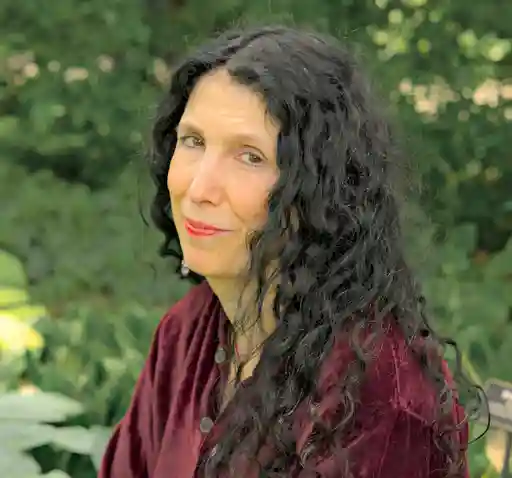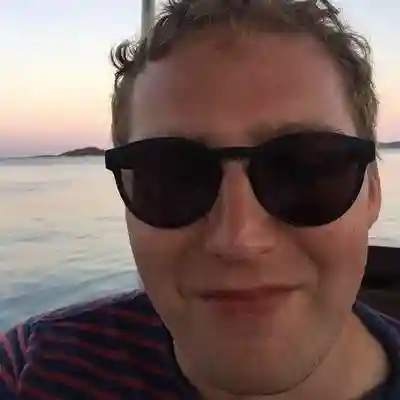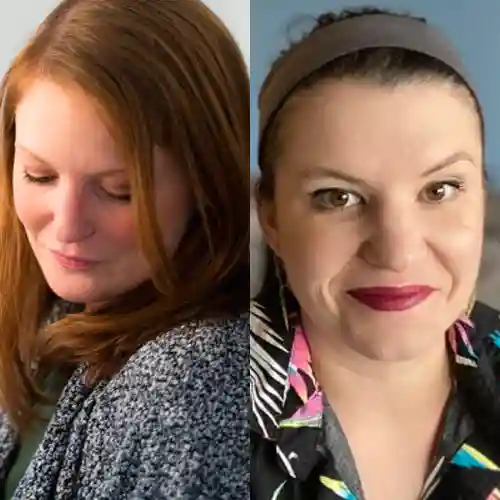You can request a query review from Fran through her Reedsy profile.
For bonus marked-up submissions that did not get featured in the live session, head over to this post.
Fran: So I just wanted to say that you can really easily and readily and maybe almost even dangerously find a lot of information about how to put together a query letter.
Sometimes, I can sense this because one of the services that I provide for Reedsy is a review of query letters. So I get a lot of them, and I really enjoy doing query letters. It gives me the same feeling as doing a crossword puzzle. It's, you know, you go in, and you just figure it out.
And so I can tell when somebody is a little overeducated, and they've read too much, and they're doing all the latest things that are out on the internet. And so there's, there's, you know, a little bit of an overcorrection. But there is a lot that's out there. Basically, it's just a simple format that you really should not stray from, and I'll get to that in a minute.
But what I wanted to give that was possibly different is a sense of your audience, who you're writing to. Because It's, you know, sort of touches upon emotional intelligence. You're writing to somebody who's busy, or you're writing to somebody's assistant, who's also pretty busy and probably a little fearful of ever presenting the wrong material to their boss.
So everyone will veer towards the no. Saying yes to something means work. It means staying at the office just a second longer. It means figuring out how you're going to find the time to read the manuscript. If you read the manuscript and you like the manuscript, who, who do you know out in publishing that's, that's looking for this? So that's why the process is so very, very difficult.
So you're writing to somebody who is not your friend, who is a cantankerous New Yorker who's seen everything, who wants to say no. So, with that in mind, you really do have to be as sophisticated, as articulate, as aware, as well-read, and as clever. You want to show your intelligence, all within just basically a drop of ink.
Hopefully, most people know that the components of a query letter are:
- The quick pitch. A hook that's like a couple of lines;
- The very short synopsis, maybe three lines;
- The about you, and
- The closing.
So it's really just three paragraphs, and the best way that you could come up with three paragraphs, the closest that you can adhere to that is, you know, the best that you can do.
There are a couple of ways to approach that hook.
The “when” formula. Take Bridges of Madison County, for example. When Robert Kincaid drives through the heat and dust of Iowa's summer and turns into Francesca Johnson's farm lane looking for directions, blah blah.
Then there's the “what” formula. Let's take Shantaram if anybody's read that. The story of an escaped convict as he reinvents himself and takes the reader from the slums of India to the mountains of Pakistan.
Then there's the “who” formula. Narrated by Cole Daly, an Irish peasant girl kidnapped from Galway.
Then there's the “where” formula, which is actually a little bit like the Shantaram one: Taking place in turn-of-the-century New York City….
And then there are variations.
Your author bio
I think it's also worth mentioning that in your bio — again, this is back to sort of this, this cosmopolitan, fast-paced, New York, cutting-edge awareness — you want to make sure that you mention information about yourself that's relevant or that's impressive. I can't really think of another way to say it.
So, things that possibly your friends, your neighbors and your family love about you might not be exactly what is included in a query letter. Information about the book group that likes your work is definitely not appropriate for a query letter.
But if you have a great accomplishment, if there's something particularly quirky, if there's something that can also, in some subtle way, give us a sense of your voice. If your book is funny, then it'd be nice if the query letter just gives us a clue that you are funny.
It's all quite a trick, and I would say it's great that there are people out there who can help you read it. Professionals on Reedsy and also possibly just other people that you know in book groups. Certainly, make sure that you have no typos — and also that you have some good comps. (Comps are the books that are already published that will help an agent frame what you're sending them.)
And for those, again, it's, you know, apply your common sense and don't, don't pick out comps that are just runaway bestsellers. Don't try to be humble, but also confident. Don't be a fantasist. That's probably the best, most blunt way of putting it. And with that, we can maybe begin.
Martin: Note: Avery Chao is the fictional name of the agent that you were supposed to send it to. I sort of put it in there as sort of a trap, a test to see if people read the instructions. And I can tell you that 35 percent of people who submitted for this event did not read those instructions correctly.
1. Not a query
Avery Chao, is there a publisher who will not require payment from me, but, instead, will agree to publish my book and take all the royalties?
Fran: So, this is obviously not a query. It doesn't mention anything about the book. And it's probably a really great introduction to what I'm saying about knowing your audience. This first audience that you're reaching is not your friend. They're not necessarily nice people. They're very prone to sarcasm and general jadedness about the world. They will think that this is a very uneducated person who has done absolutely no research. I mean ‘uneducated’ in terms of knowing how to write a query letter and hasn't done the research. So no agent has the time to respond to this.
Martin: I guess someone who contacts you and doesn't seem to know how publishing works gives off a sense that they’re going to be hard to work with.
Fran: I mean, if you are Taylor Swift and you haven't written a query letter, no problem. But if I know nothing nothing about you, there's nothing in this. And it's also a little presumptuous to think that somebody has the time to answer this.
As with everything, it all comes down to this emotional intelligence. There is a sweet spot between knowing too much and being overly obsequious in a query letter and not knowing enough. So attending the Reedsy webinars is a great idea, attending any Writers Conference is a great idea, and hearing from the people themselves who have been through it, who are veterans of the industry, is very useful.
If you could put a little post-it on your desk, it might say, “The agent is not my friend… yet”.
2. Picture Book
Dear Avery Chao
I hope this letter finds you well. I am thrilled to introduce myself as a new author and a passionate mother of two. As I embark on this journey of creating imaginative stories for young readers, I am eager to submit two heartwarming children's book manuscripts for your consideration, one picture book and one board book, respectively.
The first manuscript, "I Lost a Blueberry in My Bed," is a delightful tale that captures the essence of childhood wonder and the adventures that can unfold in the most unexpected places. It follows a little boy who embarks on a whimsical quest to find a lost blueberry, offering young readers a story of curiosity, imagination, and the joy of discovery.
The second manuscript, "When the Stars Snore," transports children into the magical world of the night sky, where a young girl sneaks out to listen to the lullaby of the stars' gentle snores. This enchanting story combines the universal experience of bedtime with a touch of cosmic magic, fostering a love for both the nighttime sky and the power of sound.
My experience as a mother has not only inspired these stories but has also instilled in me a deep understanding of the importance of engaging, heartwarming, and educational children's literature. I believe that both manuscripts can capture the imaginations of young readers and provide valuable moments of connection and discovery.
I have attached the full manuscripts of both stories. I am excited about the possibility of working together to share these stories with a wider audience and make a positive impact on the world of children's literature.
I look forward to discussing my work with you and exploring the potential for collaboration. If you require any additional materials or information, please do not hesitate to contact me.
Thank you for considering my submission, and I appreciate your time and attention.
Best regards,
Fran: So the first thing I'll say is, referring back to the overall theme that the literary agent wants to find something great for their career, they're not thinking about you at this stage. Once you are a client, they’ll have fiduciary responsibility, and they will certainly care about you. A good agent will. But they're not making any money reading query letters. It's a very late-in-the-day thing, or it’ll be an assistant or an intern that's reading the query letters.
The way an agent spends their day most productively is negotiating contracts and sending out submissions for the clients that they already have. In my case and in some agent's cases, they’ll be editing work and talking through problems with the client. It's going out to lunch with editors or meeting editors on Zoom so that they know the whole landscape.
They know everybody, they have great relationships with everybody, and those are the really important things. And then, at some point in an agent's career, hopefully, they won't really be taking on very many clients.
So once again, this is why your query letter has to be short, sharp, confident, and self-aware. So maybe with that in mind, you can all follow along with this and understand the danger zones.
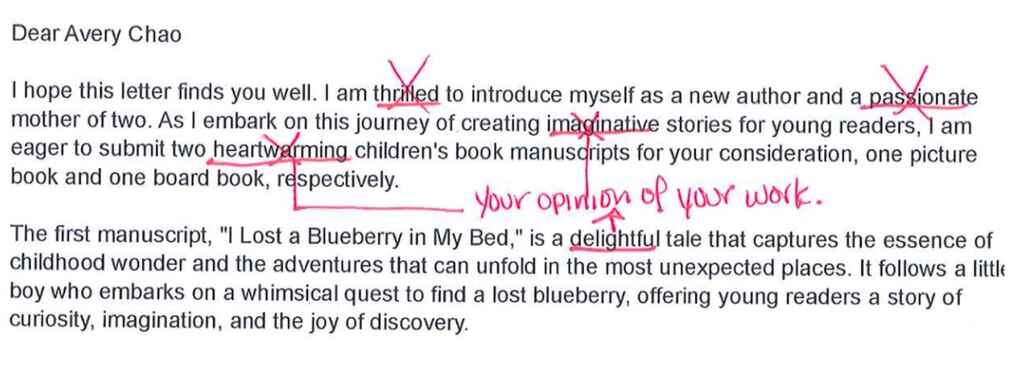 So, I know you have to have some beginning, but I know that you're thrilled. And I know why you're writing to me. You’ve just got a drop of ink to get my interest, so just leave that out.
So, I know you have to have some beginning, but I know that you're thrilled. And I know why you're writing to me. You’ve just got a drop of ink to get my interest, so just leave that out.
Don't give me your opinion of the work. You can be confident about it by just saying what it is. But it's the job of your description, your hook, and your quick synopsis for me to feel whether it's heartwarming or not. So that accounts for the various cross-outs here.
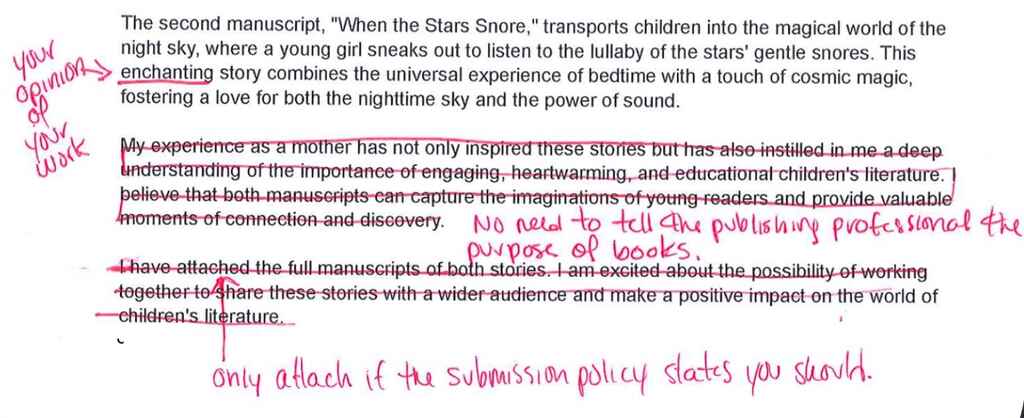
Again, we've got the opinion, and then this, this whole paragraph was just crossed out. There's no need to tell me the origin of fiction, picture books, or publishing in general. That's a given. So save your ink on that. There's probably nothing new that you can tell me about it.
And your inspiration: unless it's really relevant to the actual book unless you’re writing about the quest and the adventure that you are on — or if some particular trauma has led you to write the book — I don't really need it. It's sort of a generic inspiration, being a mother. I'm sorry, I am one, and good for us, but it's not special, you know. It’s worth mentioning, perhaps, but really not as a qualification.
The attached manuscript? You have to look at the submission guidelines. There are lots of ways to look for agents, but I recommend people join Publishers Marketplace. Each agency has its submission guidelines, so you do need to adhere to those. Most of them tell you not to attach a manuscript, and if you do, it’s often a flare. They all have a program that actually will discard queries with an attachment. So you know, do look at the submission guidelines.
Martin: Question: Is it a mistake to pitch two books in one query?
Fran: There are two things I also need to say. With a picture book, it's probably okay. I mean, you're not taking that much time. It's probably good to know somebody has more than one picture book up their sleeve. (One reason why I didn't represent too many picture book authors is because they are so prolific, and there's just no room for all that they're going to be coming out with.)
So I think two is okay in picture books. I don’t necessarily think that, across the board, it’s a horrible thing to mention that you're working on something else — an agent wants to get bang for their buck. If they're interested, they want to know that you are committed and that you are writing more and more.
There's a sweet spot. You just can't be a fantasist or too aspirational and mention your entire library — then that starts to feel like danger. That somebody hasn't been thoughtful enough.
The other thing is we don't have information about whether this person is an illustrator. So you need to say, “ I've written a picture book that I hope a publisher would find an illustrator.” Maybe suggest some illustrators that you like. In picture book writing, you do not want to pre-pair yourself with an illustrator unless they're of note or unless it's amazing.
If you yourself are an illustrator, then it's worth a shot — but publishers like to pair writers with illustrators themselves. Because an unknown writer perhaps will pair with an unknown illustrator. I'm not exactly sure of all the ins and outs, but that is, that's kind of the rule of thumb. And I think just also that publishers enjoy that collaborative aspect. It's kind of like when you're creating a motion picture; there are people whose job it is to put the whole vision together.
3. Nonfiction: Food
Dear Avery Chao,
Does the world need another cookbook? Well, YES, if it differentiates itself from other offerings by an approach that addresses the target audience’s culinary considerations. That is why I am writing to query a different type of cookbook, The Bistro Cooking Guide, a family inspired collection of Classic Italian and Mediterranean recipes that were taste-tested in the author’s restaurants.
However, the book takes a unique approach in that the recipes have been simplified in a way that makes them easy to prepare without sacrificing taste or quality. How is this possible, you may ask? The book explains this in detail. Is there a need for this type of book, you may also ask? Everyone must eat, and most would love a delicious meal at home notwithstanding time constraints or lack of culinary expertise. Modern lifestyle’s leave little time for basic demands let alone making restaurant quality meals. So, what if can be shown how the average person who is short on time, and perhaps skill, can prepare delicious, restaurant-quality meals quicker and easier than traditional recipes?
We are not talking about heat-and-serve items or crock pot meals, but true time-saving recipes that emulate the ‘from-scratch’ method without sacrificing taste. And do this in a food genre that is truly one of the world’s most popular, Italian Cuisine. In addition, the book addresses many consumer complaints in that there are sections for those who want to expand their culinary skills.
The author is a professional chef with over 15 years of experience and the former owner of several award-winning restaurants. Although in a different genre, the author has had many articles and essays published over the last decade. However, the soul of the book and the foundational recipes originated in the author’s Italian immigrant family. In fact, it was his mother’s ‘Old World’ style of cooking to which he pays homage. The book is highly personal, and this aspect is shown clearly in the presentation.
Kindly find attached a comprehensive proposal with included chapters and supporting graphics that addresses many questions you may have including the author’s writing style and planned use of his social media (including a website and blog post) to actively promote the book.
Thank you for your consideration.
Fran: By now, you probably have some ideas of where this author has stepped in it.
This is an expert, and he hasn't really told us anything about his restaurant. And I think that in the cookbook world these days, many of the authors are restauranteurs. They're famous chefs, they're prize winners — they’re in all the cooking shows. They have something.
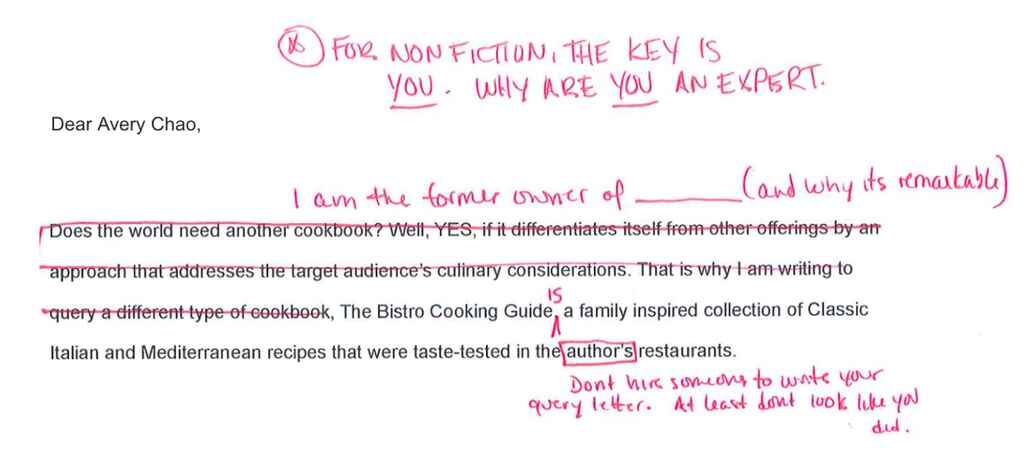
This is not ever going to convince anybody. What is this restaurant that people flock to that is so fabulous? First, start with that: tell us all these wonderful things that make you the expert, and that will whet our appetite for your credentials.
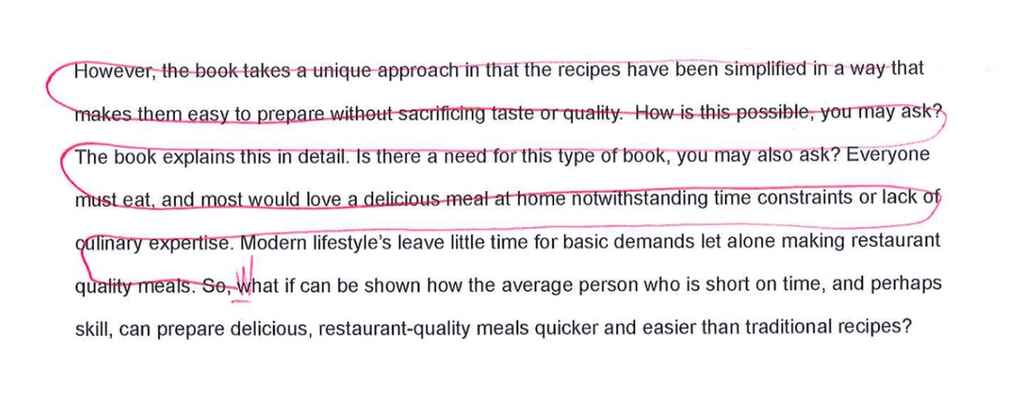
Definitely do not keep asking all of these questions because that's wasting time. You know, those are the givens.
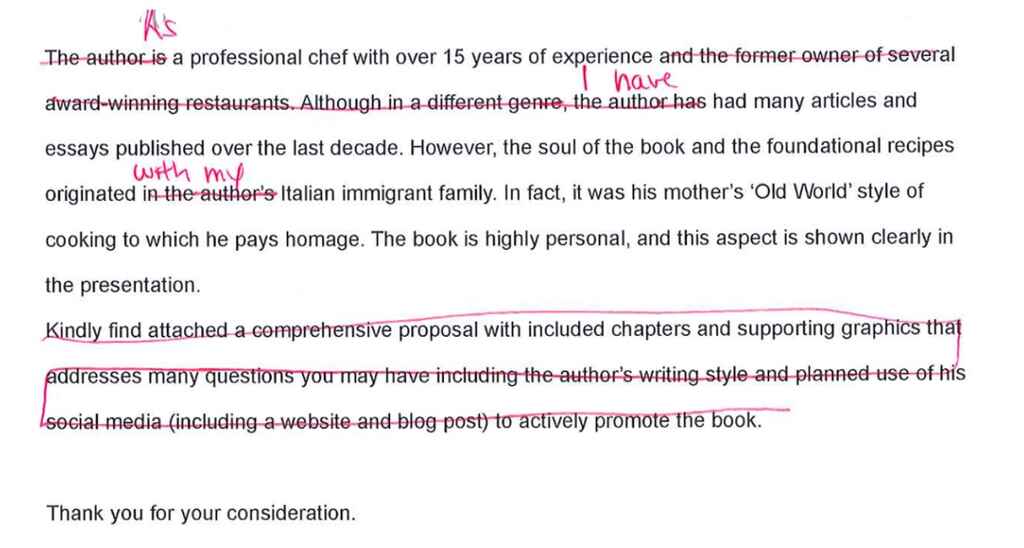
Don't have a query letter written as if it's not written by you. Unless, again, you're a celebrity, or nearly a celebrity, or there's some particularly compelling reason why you wouldn't be writing your own query letter, write your own query letter. So you wouldn't say, “The author is…”
You talk about your social media marketing. That's great. That's a great idea. I should have brought that up myself that in your bio, if you have a platform, that's fantastic. And people will probably always ask you, do you have your own platform? We're still going to always be lovers of books. It’s very hard for debut novelists to have a platform [so there’s less of an expectation].
But in nonfiction, it's great if you do. But tell us about it. You know: How many people? Where is it? Where can we find it? Give us some links to that.
So basically, there's not much that's terribly salvageable. I would mostly say start all over. You wanna quickly explain why you are the one to write this. So we might not wanna wait all the way to the bio section — but the bio might fill us in a little bit more. In the first part of this you want to say:
“I am the proud owner of these restaurants, or my restaurants were once the gathering place of families for 30 years. Many have tried to replicate my signature dishes, but I am here to show you exactly how to do it in your own kitchen to taste restaurant quality.”
So think about it with something like this, I think you want to think about it like a book jacket. What is the aspirational goal for this and what should it be to all people? What would make people pick it up off the shelf? It's about food, so really whet our appetite. Tell us, “My gooey lasagna, my savory whatever.” Just use some of these wonderful mouthwatering words.
I don't know how many people are cookbook writers out there, so the information I'm giving is rather specific. But in how-to books and narrative nonfiction, there is maybe a shift in having the bio come first.
4. Contemporary Romance
Dear Avery Chao,
Landi Granton, an orthopedic nurse in rural Alberta, just found a man bleeding to death in the back of her rented U-Haul. Just another layer on the crappy cake that has become her life. She’s inches from declaring bankruptcy, raising her ex’s kids in his wife’s stead, and being harassed by a dead patient’s son. So, of COURSE, there’s a man dying on her new-to-her couch!
Tyr Lattimore, who’s been the perfect weapon for half his life, just woke up in a civilian’s farmhouse after the worst mission of his life. The spy learns quickly that ‘the simple life’ is anything but. After weeks of rehab, his real life - a life he’s beginning to lose faith in - crashes into hers. Now he must choose: return to the life he knows or stay with this strange woman who he is coming to admire and adore.
ADONIS (110,000 words) is a dual-POV contemporary African-American romance. It explores the themes of recovery, rehabilitation, and ultimately love. It can stand alone, but I envision it as a trilogy. It is my writing debut.
I think of Adonis as Tawna Fenske’s The Hook Up meets Kristina Forest’s The Neighbor Favor. I am originally from Philadelphia, Pennsylvania. Now I live in Calgary, Alberta as a right-brained Registered Nurse.
Thank you for your time and consideration.
Fran: Okay, so this was really close — even though I’m like, “There's a lot wrong with it.” It effectively brought forth the voice, and that’s not an easy thing to do. It was funny, and this person touched on the important things. Organizationally, it needs some work, but I really applaud that we got the humor, the voice, the pacing, we got the jauntiness.
It was framed within the African-American romance genre, which pops — and I think it's probably something that people are looking for. And I appreciate that that's where this, this author left it and didn't become opportunistic or call it “own voices”. This is a genre romance and written by an African American, so we're going to have that hopefully being the milieu.
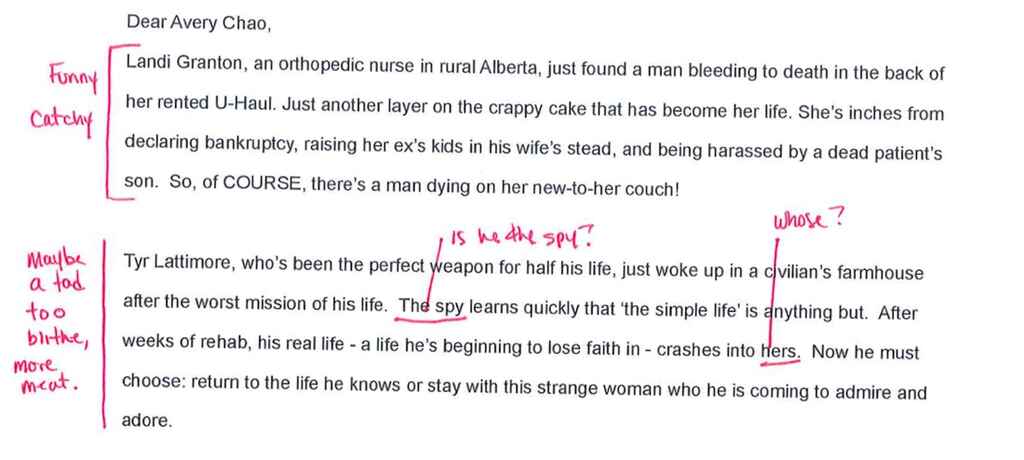
So what was wrong was we didn't really have the first hook. The first two paragraphs are the synopses. And even though we've got the voice, it's not quite adding up. So we might wanna just take a breath and have a little less punchy-punchy and a little more sincerity.
You can leave out something too. It's not a truth test. It's better to leave out maybe the Ty Latimore part or just give us a little bit less about him. Whichever one you choose. Right now, we've just got too many little snippets competing, and it's not coming together as a whole for me. We want a beginning, a middle, an end, and a propulsion of its own.
But I still think, great job! Maybe this person honed it and honed it and honed it too much. Maybe it needs somebody to read it and say, “I know it's funny, but I don't know exactly what it is yet.” So that's, that's all I really have to say about that.
I had some questions. I mean, I didn't know if he was a spy? Like, this person knows their books so well that they also don't know what kind of what they're not saying yet.
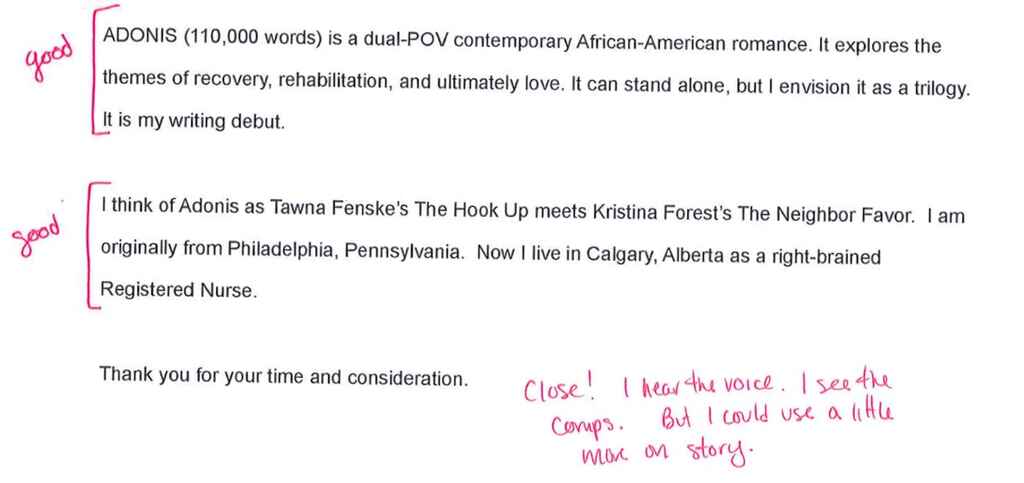
5. Fantasy Series
Dear Avery Chao,
My book titled "Esmerelda's Quest 1: Deliverance" is the first in a series of six fantasy novels where an elf maiden seeks to rule her own destiny and find her elf in shining armor but must checkmate a king in order to realize it or forfeit life's game.
Esmerelda, an older elf maiden, hides in the Black Moor because of an ambitious king. She hides because he has blamed a drought plaguing his kingdom on practitioners of magic. Therefore, the king hunts all practitioners of magic. Esmerelda is a novice having been taught some magic by her stepmother. That has made her a target of the king.
Amid all this, she naturally longs for love but must overcome a tendency towards timidity. Her uncertainty, caused by years of seclusion, entices her to dream of meeting an elf cavalier who will come, defeat the king, and whisk her away to his castle. Finally, she makes the decision to take matters into her own hands and seek out her own destiny.
However, an obstacle in the form of a twin sister, long thought to be dead, has arrived to haunt her and threatens to crush her remaining self-confidence. A clan of vicious gnolls, (hyena-like monsters), complicates her task and have brought with them a dwarf-sized bundle of trouble. He has confused her for her sister who has betrayed him in the past.
An ambitious gnome and a scaly lizard arrive to offer her hope, but at a high price. To mitigate the cost, she commits to a brazen but risky endeavor that could possibly prove to be fatal.
My fantasy novel is 99,052 words in length and is titled “Esmerelda’s Quest 1: Deliverance” and is the first of a series. I am a father, grandfather, and great-grandfather who has loved storytelling all my life. This is the first work of this length that I have written. I have attached the first ten page of my manuscript in a PDF document to this email.
Thank you very much.
Fran: What I did with this mostly was just punch it up by taking things out. Just be aware of somebody's limited time and take out a lot of stuff.
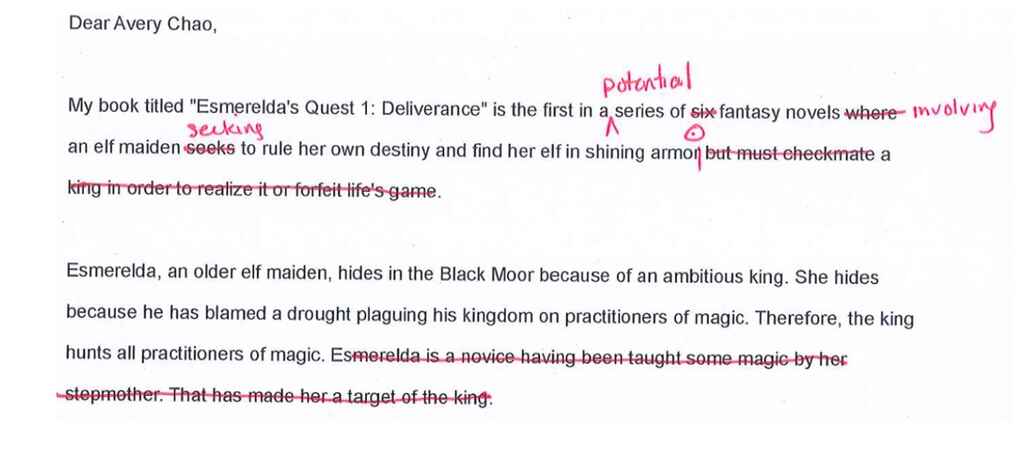 It's really fine if what I took out sounds good, but maybe it's not exactly what happens. It's fine. All you want is somebody to ask for it. They're not really going to remember every little detail. You just want them to ask for it.
It's really fine if what I took out sounds good, but maybe it's not exactly what happens. It's fine. All you want is somebody to ask for it. They're not really going to remember every little detail. You just want them to ask for it.
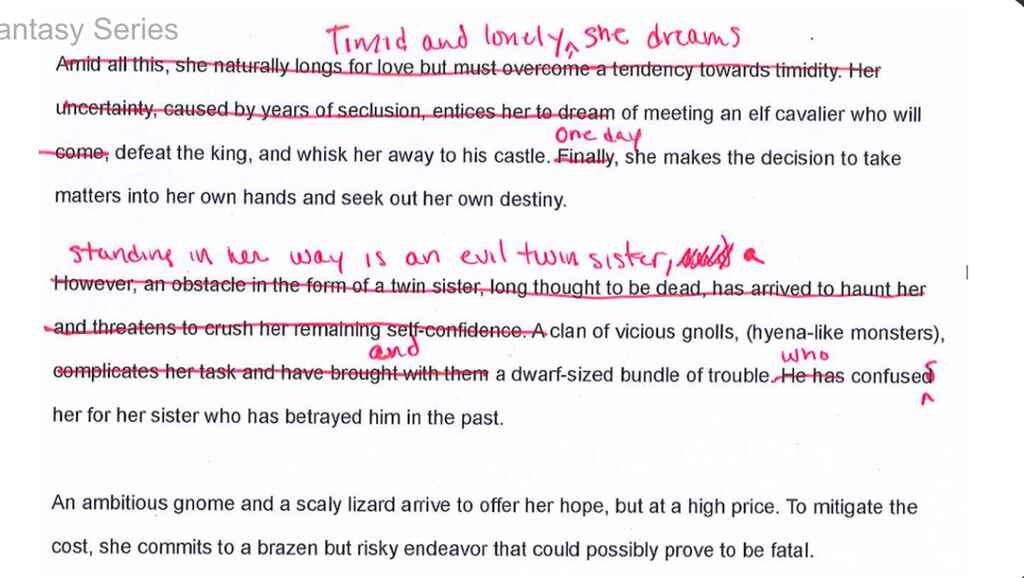
People do get a little caught up in things like “people call her JR, but their real name is Jen.” Don't worry about things like that. The goal is for them to be hooked. So that's mostly where this red ink is. It's in punching it up.
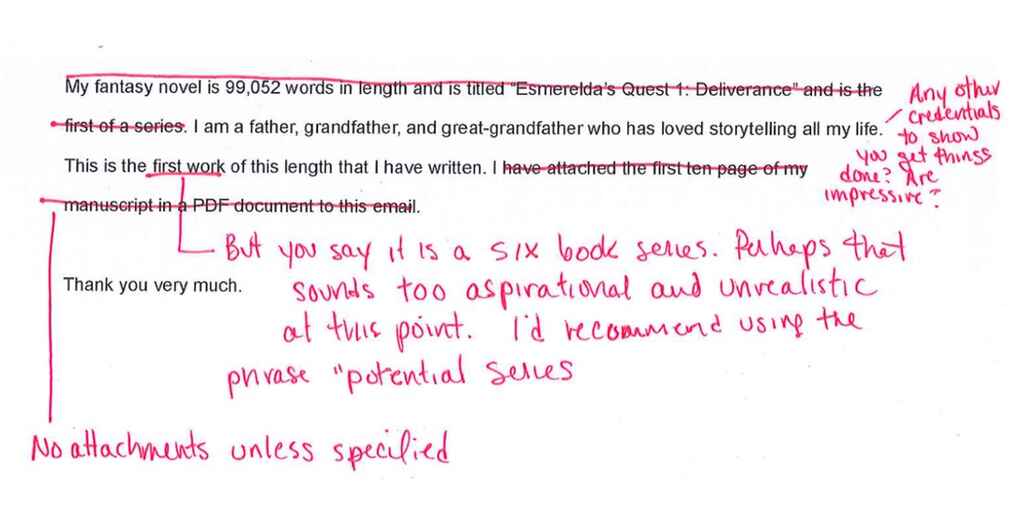 But the one thing also to note, and we kind of went over this is when, when he says it's the first in a series. of six fantasy novels. That's a lot. That's a little, that's a, that's a little unrealistic.
But the one thing also to note, and we kind of went over this is when, when he says it's the first in a series. of six fantasy novels. That's a lot. That's a little, that's a, that's a little unrealistic.
And it's better to just be humble and just say “potential series,” but just don't get so ahead of yourself. You're a grandpa who hasn't written anything yet. So just stick with the one and say there's series potential. That's a very quick and concise way of putting it.
And, of course, don't attach anything unless it's specified in the submission guidelines.
Also, you don't say much about yourself. So, you say “father, grandfather, great grandfather who's loved storytelling”. That's warm. That's nice. I think that softens people a little more than saying, “I'm a mother of two” but something else, possibly, would be good. Where do you live? What did you do?
Martin: Question: are agents turned off by the potential of a great-grandfather whose writing career is probably limited?
Fran: He doesn't seem doddering, and people can be great grandfathers at a wide range of ages. He says he's got six books. I don't think that that's a no. I don't think that's at all a reason to say no, but it's valid. Other people might, but I wouldn't.
6. Literary Fiction
Dear Ms. Chao,
What would you do if you were given the career opportunity of a lifetime, knowing it would change your life—and perhaps the world—forever? This is the decision freelance editor Noah Klein faces in my new novel, PROJECT BEACON, a work of literary fiction, complete at 114,000 words.
Noah is hired to create annotations for a new publication, the World Unity Bible. Its publisher has created an enlightened version of scripture that focuses on inclusiveness and acceptance. Over the course of twelve months, Noah creates his annotations, words of love and acceptance for all people. The work fills him with hope that this new Bible can usher in a time of peace and brotherhood. A beta release to select houses of worship yields positive results, earning Noah recognition for his efforts.
But on the day of worldwide release, things go terribly wrong. A malicious employee sabotages the galleys of the new Bible, inserting blasphemy and heresy, in an attempt to condemn the publication and bring fundamentalists to his new cult. Groups of white nationalists around the country organize a day of violent protest against anyone different from themselves. Noah must defend his work, as well as the people threatened by its release.
PROJECT BEACON is a story of inspiration and a warning about toxic religious fervor, combining the spiritual suspense of Dan Brown’s The DaVinci Code with the wonder of Richard Bach’s Illusions: The Adventures of a Reluctant Messiah.
I am a freelance editor with almost thirty years’ experience. Previously, I have self-published The Messenger Series under my given name, a six-book series of paranormal suspense tales. I have three decades of experience in journalism, fiction writing, and playwriting, garnering a handful of national awards and productions presented on NPR Playhouse.
Thank you for your time and consideration. A synopsis is available upon request. I’ve attached the first three chapters as a Microsoft Word document.
Sincerely,
Fran: Okay, this was pretty good. As you can see, it's not it's not too heavy in the red.
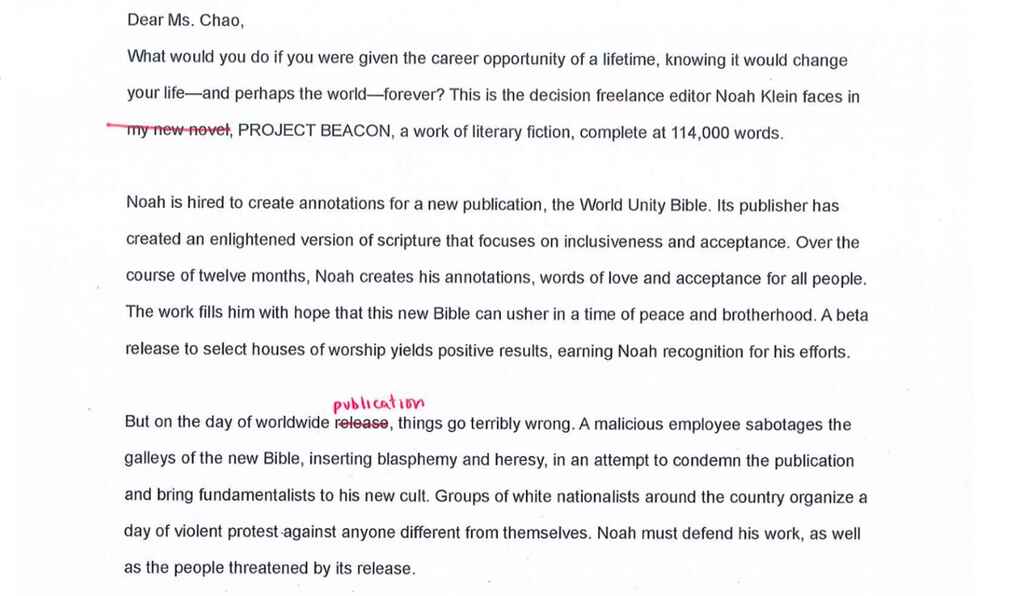
One thing to mention is that it's not a novel; it's a manuscript. So it's not a book, and it's not a novel; it's a manuscript or a work. And I go further and say you're not an author; you're a writer.
I changed “release” to “publication” because it just seems better to me. A song is released, and a book is published.
Then, next, I realized that this is more than three paragraphs, but I found it readable, so I didn't mind it. Red flags didn’t come up for me. So sorry — every rule can be broken, as long as it's good. But this, towards the bottom, I changed it a little, I wanted it punchier.
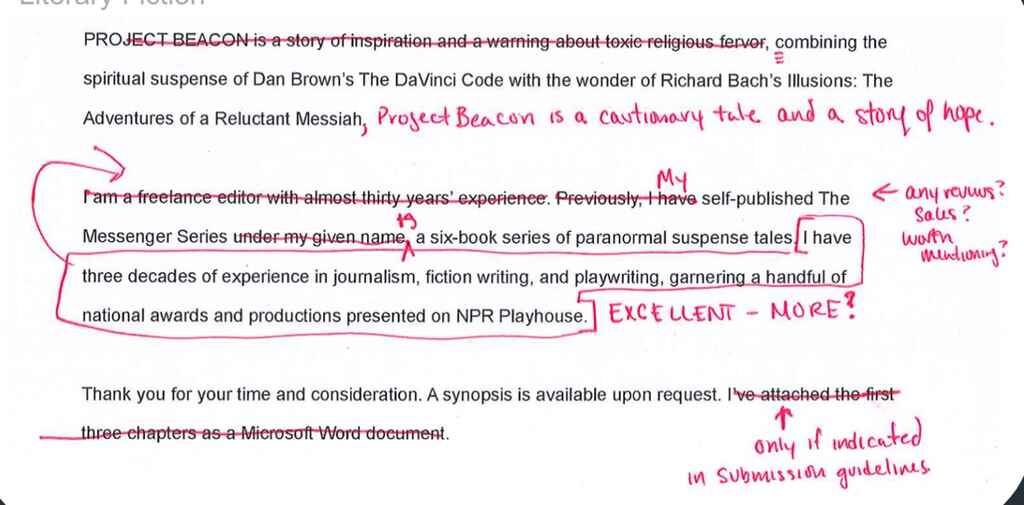 You could put these comps and the hook in the very beginning, but I happen to actually like how it flows. I think that's fine.
You could put these comps and the hook in the very beginning, but I happen to actually like how it flows. I think that's fine.
I wanted to just make it a little bit shorter, so I took out the freelance editor bit. Because I don't know what it is. Editing what? I mean, is it relevant? I'm not sure. We should assume that you're a good writer, whether you've been an editor or not, but if you're an editor where it's relevant, then explain that.
Self-published, you can put that in — but I'd like to know if there are reviews. Why is it worth mentioning? If you're mentioning it, there's another side to that. Like, if it didn't do well, then that's going to be a negative. So you don't have to mention everything unless it's a boon — unless it's going to get you that request.
And then… you say that your work was presented on NPR. Well, that… that goes front! That's a big deal. So let's hear more about that. Did you get reviews? Again, blow your horn. If you have one to blow, that's relevant.
And then that's it.
7. Memoir
Dear Ms. Chao,
My memoir BEIJING BOUND (100,000 words) recounts my transformative year as an expatriate in China's capital. This is an intimate insider's perspective into the highs and lows of life as a foreigner, including navigating both an enigmatic culture and unscrupulous corporate dealings.
After burning out as a U.S. Congressional press secretary in 2007, I seized an offer from a Chinese firm. But my ruthless Aussie boss, who abused staff and scammed officials, threatened my new life. A bombshell exposé about his misdeeds was published, leading my colleague and I to orchestrate a risky escape. Despite this, I formed friendships and discovered a traditional yet dynamic country where people sought fulfillment and purpose like anywhere else.
I provide raw glimpses into modern Beijing on the cusp of historic change. My Western assumptions were challenged as I struggled with chopsticks and relationship complexities. A genial lunch invitation unexpectedly turned into a marriage proposal! As a gay man exploring the tantalizing nightlife, I stumbled upon a vibrant underground scene. Teaching English offered solace, bonding me with locals soon to study abroad. Those intense twelve months of living on the edge changed me forever.
With insightful narration, BEIJING BOUND captures the heartache and resilience required to find oneself while lost in translation. I have an insider’s view, having lived in Beijing for 13 years and becoming the first foreigner hired by China’s state broadcaster. My extensive network provides a robust built-in audience to support a comprehensive marketing strategy. With echoes of Peter Hessler and Fuchsia Dunlop, my story offers an original, engaging cross-cultural narrative.
Please let me know if you would like to see more. Thank you for your consideration.
Fran: So, I did do a fair amount of chopping this one up. I had no real idea of what it was.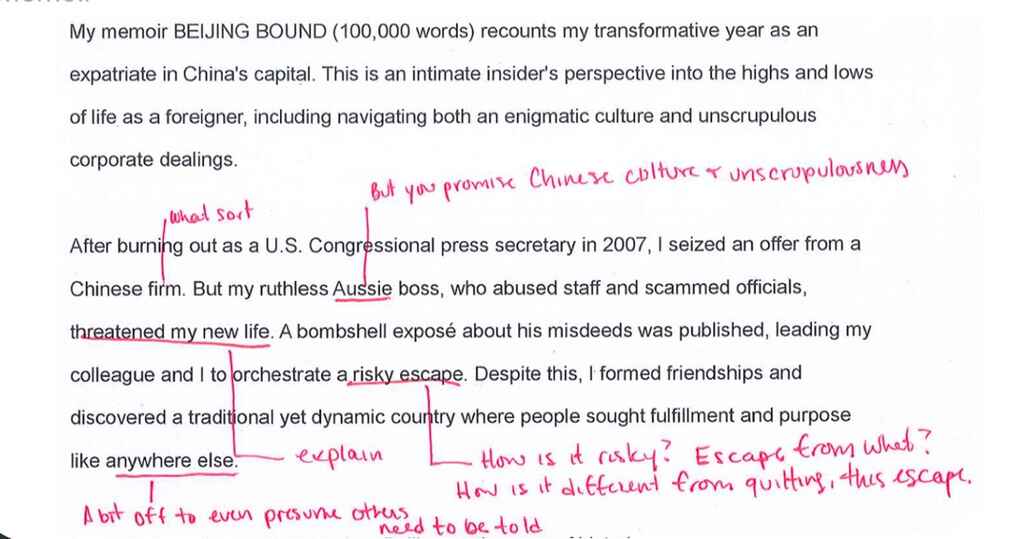
It didn't seem to refer back to its original premise. I didn't get the I didn't get the specific China danger. The boss is Aussie. Is the danger because the writer is gay? I'd like to hear more about that. That might be interesting.
My comments are really specific about this and not necessarily translatable for all query letters, but it didn't have a narrative. This was like this idea, then this idea, then another idea. And, and I have no idea if we're leading to just a big nothing.
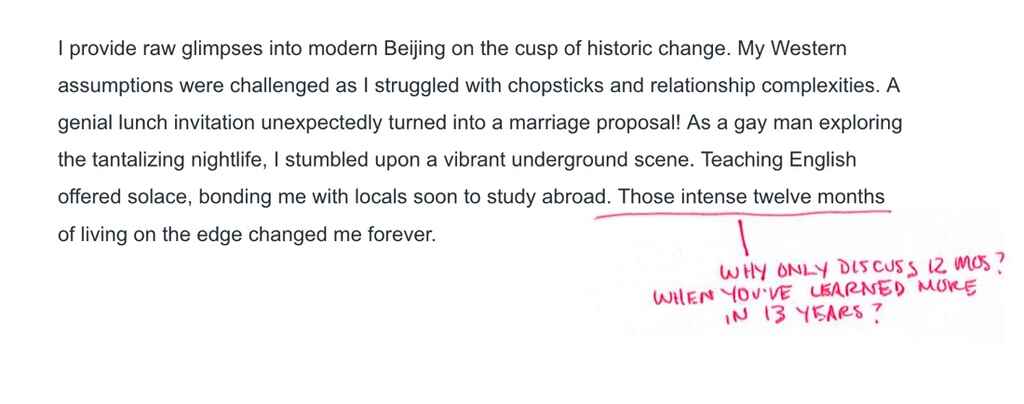 Why were the first 12 months more important than looking back over the 13 years? That might be very interesting. In 13 years, you might've seen quite a lot of change in China, where it was a positive change in things that Westerners can feel confident in. Possibly a turnaround in that and go and things going on with Hong Kong.
Why were the first 12 months more important than looking back over the 13 years? That might be very interesting. In 13 years, you might've seen quite a lot of change in China, where it was a positive change in things that Westerners can feel confident in. Possibly a turnaround in that and go and things going on with Hong Kong.
Thirteen years might be interesting. What is the really interesting thing going on? It couldn't have been that bad because he’s still there. So again, all these questions that are zinging around. Are we going to learn about burning out the U. S. Congressional Press Secretary? That sounds kind of interesting. What is the most historic change? I mean, I guess we can assume that that is, but yeah, I don't really understand the edge. I don't feel the edge this writer was on.
So if you're going to come up with your hook, go and support that hook and stick to what is supporting that hook. Whet my appetite and make me want to find out more and ask for the manuscript. I'm just not getting that.
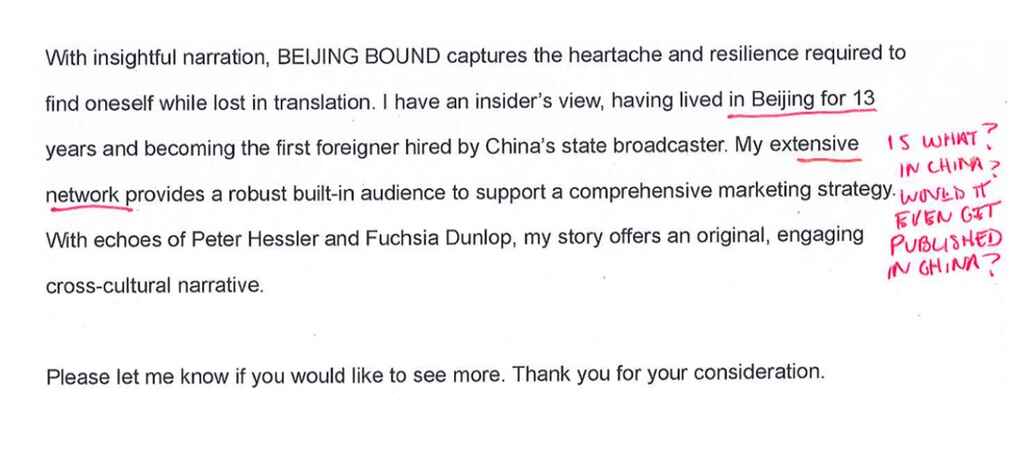 I think also mentioning the network confused me. And that's again very specific to this, but what is the extensive network?
I think also mentioning the network confused me. And that's again very specific to this, but what is the extensive network?
Because if you're going to write something that's anti-China, the network probably can't be in China. China actually is still a pretty difficult place to have free speech, so if you're going to write an anti-China book and expect to promote it on your China platforms, I would say the chances of that aren't great, and somebody who's lived there 13 years probably knows that.
8. Mystery / Suspense
Dear Avery Chao,
I recently participated in your helpful “Debut Novel” webinar, and I am encouraged that you are seeking debut writers.
I am seeking representation of my debut novel, TO CATCH A LIAR, an 85K word Mystery/Suspense story of revenge wrapped in a riddle.
Set in the #MeToo era, the story follows J.R. (Jenn) Venn, an experienced workplace complaints investigator, who is hired by prestigious corporate law firm GOD—Greystead Owens Danforth LLP—to deal with a sexual harassment complaint against its rising star lawyer.
Jenn soon finds herself dealing with resistance from the student law clerk who brought the complaint, denials and counter-allegations by the lawyer, and reluctant witnesses unwilling to talk. Jenn is confronted by an angry #MeToo advocate who accuses her of “not believing women”, and a business journalist digging for a Big Law story. As GOD protects its long-held secrets, Jenn fears her professional reputation will be smeared and that she may not be able to crack the case. Although concerned that the systems of power and corruption she uncovers will derail her search for justice, Jenn is determined to find and report the truth.
My novel will appeal to readers of Sarah Vaughan’s ANATOMY OF A SCANDAL (a Netflix miniseries), Chandler Baker’s WHISPER NETWORK (Reese’s Book Club), and Erin Kelly’s HE SAID / SHE SAID (BBC Radio 2 Book Club). Although my novel can stand alone, it also has series potential.
TO CATCH A LIAR is ideal for book clubs, as the novel’s contemporary issues and themes provoke challenging questions and will prompt contradictory perspectives from readers. The book has the potential to fit a sub-genre of Mystery/Suspense crime literature: the workplace procedural, or “workplace noir”.
As an author I draw on more than forty years of workplace complaint investigation experience focused on sexual harassment, bullying and discrimination. I’m a published author of non-fiction concerning the investigation of workplace bullying and harassment complaints, false allegations, and implementation of workplace equality programs.
To hone my writing skills I’ve taken courses and webinars on fiction writing, including mystery and suspense, from Writer’s Digest University, The Guardian, Masterclass.com, Western University Continuing Studies, and Humber College School for Writers.
The full manuscript of TO CATCH A LIAR is available. May I send it to you for your consideration? I look forward to hearing from you.
Best regards,
Fran: Yeah, so I thought that this was mostly good. Just some little bugbears of mine. But you know, in the first two sentences, we have ‘debut,’ ‘debut,’ ‘debut,’ written three times. So you have to show that you have a good ear — nobody wants to read the same word three times.
It is good to say that you participated in the webinar. That's just a little personal thing. But the word “encouraged” feels like you’re not thinking of the person on the other side. Do they care about your encouragement? Do they care about your inspiration? You have to say something, but just make it really quick. So I came, I saw this, and I felt encouraged to write to you.
Beyond that, you don't then also need to say, ‘I'm seeking representation.’ Why else would you be writing? So let's just cut to the chase. You never really need to say I'm writing to you to seek representation. I know you need something, but you can just start with the manuscript. Everybody knows why you're writing. So you don't really need that.
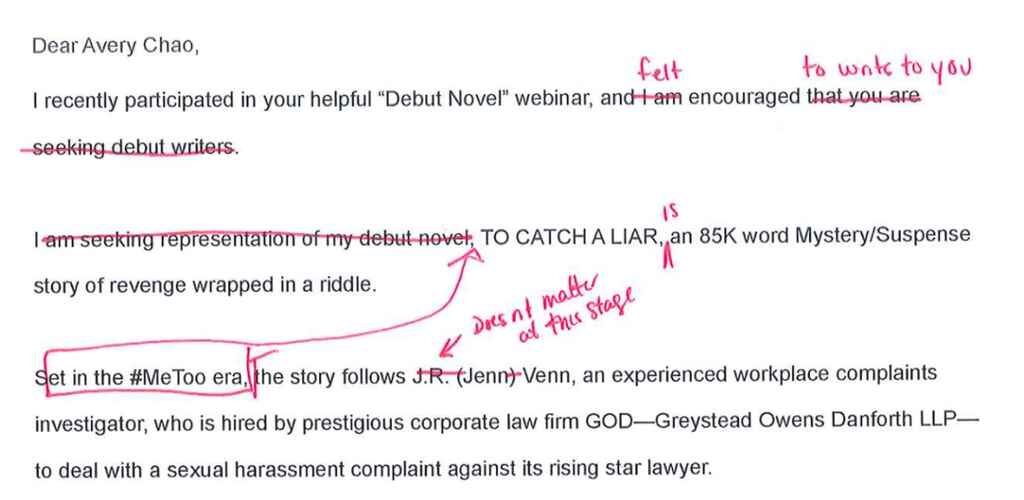
So, in this case, we just start with “Set in the #MeToo era, TO CATCH A LIAR is…” and then the next paragraph can easily follow with the story.
Again, I had already said that we don't need to know that sometimes she's called J.R. and sometimes if she's really called Jen. Just give us a name if you need a name. You don't always even need the name.
And then the rest is fine:
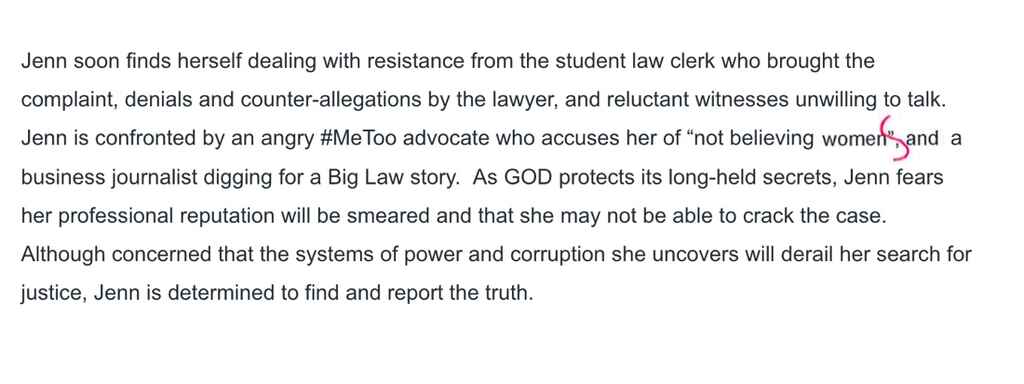
But at the very end, I have some questions about talking so much about your efforts in becoming a writer.
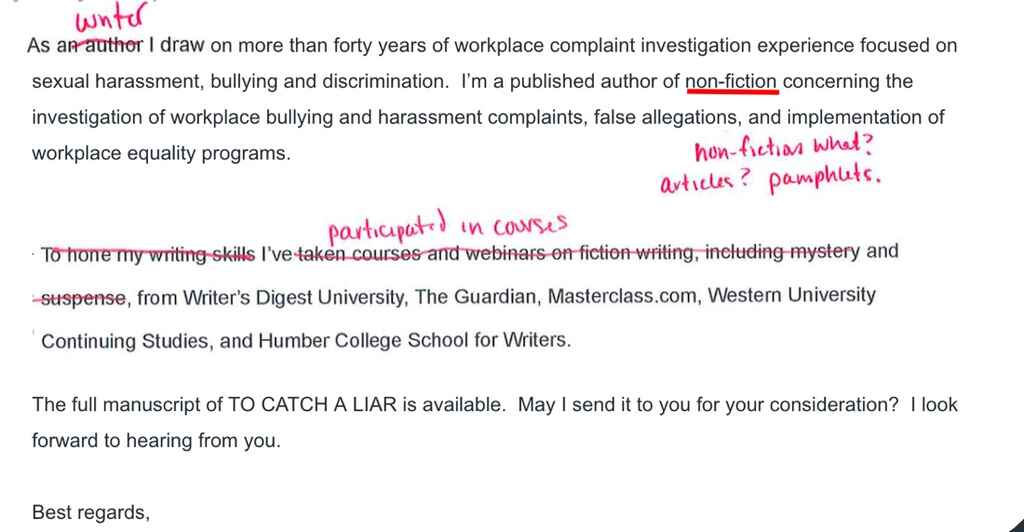
It brings to mind that this person's been at it really a long time — or hasn't had the confidence to send it out yet. It seems a little bit like overkill, all these classes.
Then the writer talks about the non-fiction experience. But what? Is it articles? I feel like by not saying what the nonfiction is — “published author of nonfiction by not saying exactly what it is, there's, you know, it's a red flag for omission. So if you want to say what it is, say what it is, or just leave it all out.
And you can just say you are a workplace harassment professional as you did in the beginning. You don't have to be a published author. Being a debut author is perfectly fine.
People are always looking for first-time authors. It's a marketing tool. It's something to say. “First-time author at 70” is also something you could say for that great-grandpa out there.
Martin: So, for this one, I think that you gave it a rewrite.
Fran: Yeah. And it was a simple rewrite!
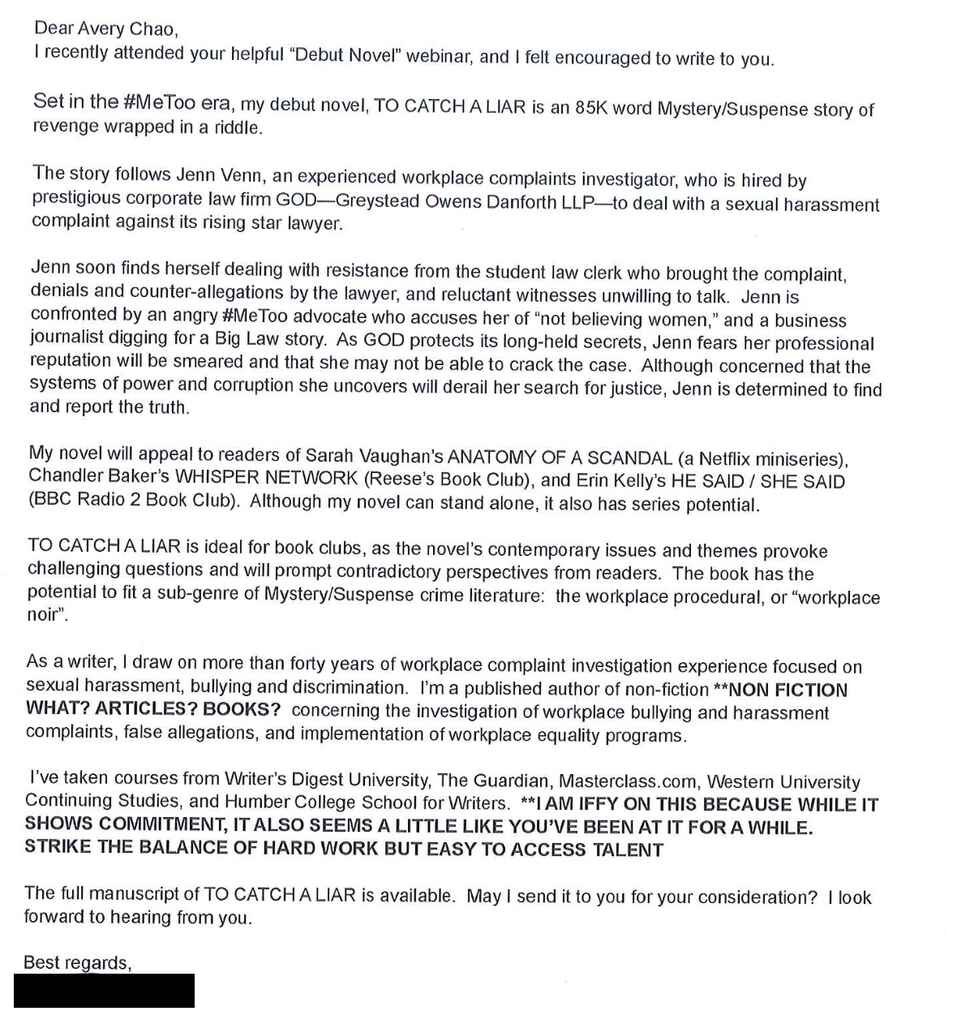
Bonus unseen marked-up submissions can be found on the Reedsy Blog.

